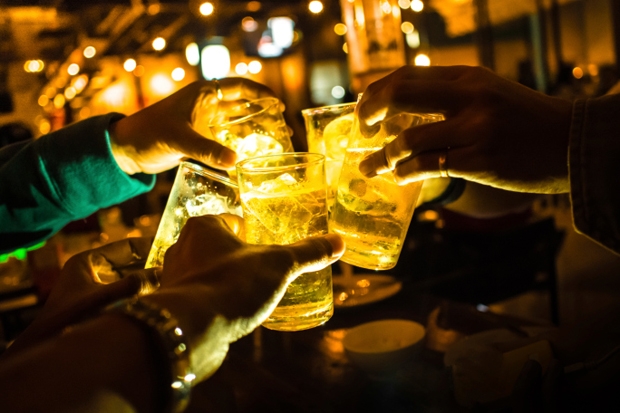The gulf in understanding between the old and the young has widened with the news that the young are beginning to turn teetotal. If there was one thing that the old thought they knew about the young, it was that they drank too much. British youth led the world in its enthusiasm for alcohol. Our cities swarmed with loutish binge drinkers. Yet now, all of a sudden, we learn that abstinence is becoming fashionable. The number of people under 25 who don’t touch a drop has increased by 40 per cent in eight years. More than a quarter of people in this age group now don’t drink anything at all. What is going on?
The conditions for heavy drinking would seem to be perfect: there is economic hardship and a generally gloomy outlook on most fronts. It can seldom have been more tempting to seek oblivion in alcohol. Yet the financial crash of 2008 seems to have had the opposite effect. It is since then that the tide has turned. It is true that times are hard and drinking is much more expensive than it used to be, but cost has never deterred the determined drinker. Nor is it possible to believe that government health campaigns have had much effect; they have never impressed the young. It is true that Muslims and Sikhs tend not to drink, but there are still not enough of them in our midst to have much impact on the statistics. There must be different explanations.
It could be that other addictions have been replacing alcohol. There is little time for group bingeing if one is glued to one’s computer or smart phone, and the digital world has its own numbing effect. Could it be, on the contrary, that the young are imbued with a new energy, optimism and sense of purpose? It would be nice to think so, but this would be really surprising. I am lost in incomprehension. But I have found from my own experience that far more people of all ages now turn down a drink when they are offered one.
The best hope for the survival of heavy drinking now lies with the old. It is to them that the health experts have turned their attention. More and more elderly men and women are now drinking too much, they say, because they don’t know what else to do with their free time. Once they have mown the lawn, or whatever else retired people do to keep themselves busy, they take out the bottle (for most of them the computer is probably no substitute). I can believe this, though how the experts think they know how much old people drink is something of a mystery, since they also say that this is a ‘hidden’ problem and difficult to detect. But this doesn’t stop them campaigning against it, warning of illness and early death and calling for higher alcohol prices in supermarkets, high though they already are.
Whatever the truth, I feel that they should leave us alone. Private drinking by the old may be a problem, but it is a private problem, not a social one. It is not a problem about which ‘something must be done’. Binge drinking among the young needs addressing, because it leads to violence and disorder on the streets. But you never see gangs of elderly drunks rampaging through city centres.
It should also be recognised that many people find it hard to get through life without a bit to drink, and it is often surprising how little it can impair their performance. Winston Churchill might not have withstood the strain of the war without regular doses of brandy, and Margaret Thatcher was dependent on a glass of whisky at bedtime. Even journalists, who are now pretty abstemious, weren’t noticeably worse at their jobs when they were regularly sozzled.
So everything is now topsy-turvy. The old are becoming heavier drinkers than the young, who are edging along the road towards teetotalism. The upshot is that the old are coming to be seen as the baddies in society, which is rather an invigorating change. It may even help us feel young again. So let us relish our new role and do so in peace.






Comments